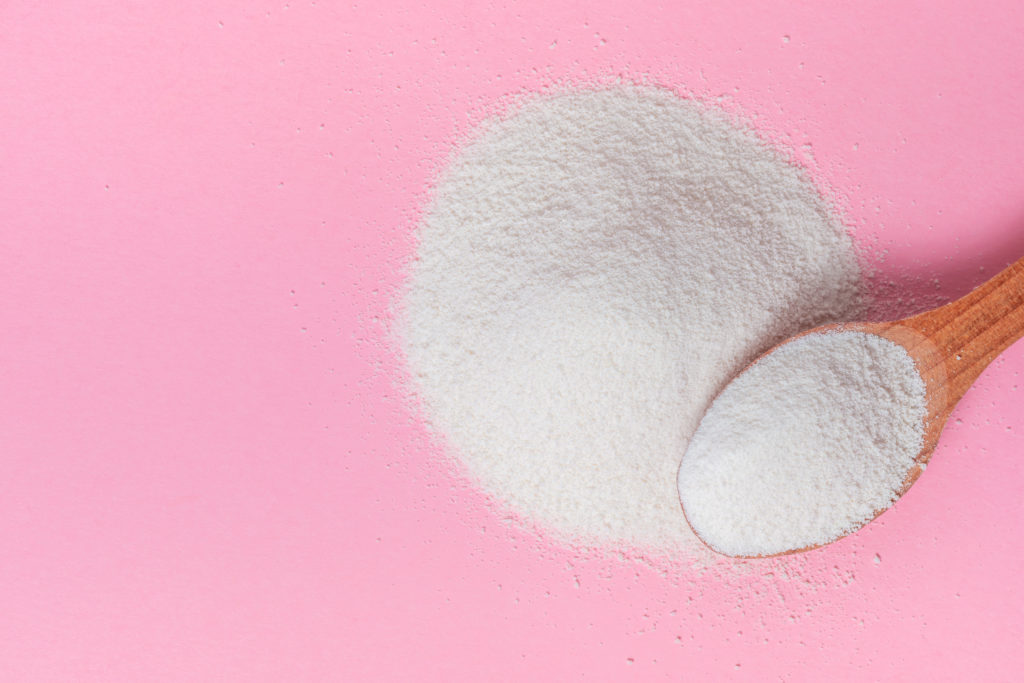We’ve been hearing a lot about protein in recent years. It seems like you can’t walk down any grocery aisle without seeing a product boasting the benefits of added protein, from cereal to granola bars, and even cookies! But what about this one protein in particular — collagen protein? Whether you’re completely new to collagen, or just looking for more information on it, we’ve got answers to all your questions below!
What Is Collagen?
Collagen protein is a compound made up of long chains of specific amino acids, just like all other proteins. It sounds super science-y, but if you’ve ever had Jell-O salad at your grandma’s Thanksgiving table, that’s basically the best way to understand collagen. Gelatin, the main ingredient in Jell-O, forms from cooking and drying collagen. You can imagine that it takes on a similar role in the human body as it does Jell-O, to provide our skin especially with plumpness and shine.
Collagen is the most common of the body’s proteins. It’s the main structural protein in our body’s connective tissues, everywhere from our muscles, ligaments, skin and bones to our digestive tracts and beyond. Sounds important, right? Just like gelatin, it provides structure and helps things stick together, which is why some people think of it as the glue that holds the body together. Now, remember when I said that collagen is composed of long chains of amino acids? Well, these amino acids are essential and not produced in the body and therefore have to be consumed from outside the body through our diet. Fortunately, we house quite an abundant amount of collagen in the skin, but as we age, we tend to lose collagen, resulting in less desirable cosmetic attributes like wrinkles, fine lines, dry skin, and brittle hair or nails. Maintaining your body’s collagen levels also plays an important role in joint health, tendon repair and skin elasticity. Some studies show that collagen can even lower blood pressure and boost muscle growth as you age. So, if you’re really starting to feel like your face is showing your age, consider your diet and how it’s contributing (or not) to collagen production. Keep reading for tips on how to get more collagen in your diet.
What Does Collagen Do for Your Body?
Collagen is the most abundant protein in the human body, so it’s definitely an important one! Besides just giving us radiant skin and silky-smooth hair, hydrolyzed collagen (the broken-down and more easily digestible form) has some serious health perks. Studies have shown that it acts as an anti-inflammatory, aids in digestion, and possibly even reduces high blood pressure — just to name a few. Researchers who studied athletes over six months have also found evidence which supports the claim that collagen supplements can help reduce joint pain (a type of inflammation).
So how do you take advantage of these health benefits? It’s all about knowing what lifestyle choices help you versus hurt you. Things like age, too much sun, elevated weight, poor diet and drugs or alcohol actually suppress your body’s natural collagen production. On the other hand, eating a balanced, healthy diet, staying hydrated and limiting stress will only increase the process of collagen production.
Are There Different Types of Collagen?
There are many different types of collagen, and studies show that different collagen types support different body parts. We’ll focus on the four most common. The main type of collagen found in the human body is Type I, which accounts for 90% of the body’s collagen. This type provides structure to skin, bones, tendons, fibrous cartilage, connective tissue, and teeth. Another collagen type, Type II, is found in elastic cartilage, which cushions joints. Type III supports the structure of muscles, organs and arteries, and Type IV, which helps with filtration, is found in layers of the skin.
Which type is best for you? It depends on your health goals and concerns. If you want more elastic skin, or a general collagen supplement, Type I is probably best. If building strength and muscle growth is your goal, you’ll want to look for Type III collagen. It’s worth noting that most protein-rich animal products, like meat and egg whites, contain most types of collagen, as collagen is one of the most abundant proteins in animals. Most collagen supplements will clearly label which types they contain, and some even contain all four! However, if you eat a plant-based diet or prefer to avoid animal products, you’ll want to check your labels. Fun fact: Most collagen comes from animals rather than plants, because it’s an animal protein, but scientists have found a way to make vegan collagen using genetically modified yeast and bacteria that mimics collagen’s gelatin-like properties. There are plenty of options that you can review in order to find a collagen supplement that works for you!
Where Is it Found?
As people age, our bodies produce less collagen, which means that we need to pay attention to our collagen intake to help preserve skin elasticity, maintain joint health, repair tendons and ligaments and protect muscle tissue. Unfortunately, there’s nothing we can do to combat age, which is why having a handle on the things we can control is so important. Consuming a diet rich in the collagen building blocks is a must, but the way you go about it is up to you. The simplest way to naturally boost your collagen is by eating collagen-rich foods: foods high in vitamin C and antioxidants like brightly colored fruits (particularly citrus fruits), vegetables and leafy greens. Another dietary approach is to make your own homemade bone broth — it’s generally inexpensive while providing a good source of collagen at the same time.
Finally, supplemental collagen is always an option, but Dr. Mark Moyad, Director of Preventative and Alternative Medicine at the University of Michigan, claims that the true health benefits and effects of collagen supplements are preliminary and still under study. That said, powdered ingestible collagen supplements can be easily added to smoothies or soups to potentially give you an extra boost. When searching for collagen supplements, organic and grass-fed animals are recommended. And believe it or not, you can also try fish collagen, which is protein derived from fish skin, scales, and bones. It’s popular because it’s bioavailable, which means it’s easily absorbed by the body. However, it’s worth noting that collagen supplements are not regulated by the U.S.
How Much Should I Take?
If you’d like to supplement a diet of collagen-rich foods with collagen powder or protein bars, you’re probably wondering how many grams of collagen you should start with. While there’s little research on the long-term effects of collagen supplements, many studies have provided scientific evidence that collagen supplements can lead to improved skin elasticity and a significant reduction in wrinkles.
Most studies recommend anywhere between 2.5 and 10 grams of collagen a day. In one study, women between the ages of 35 and 55 took 2.5-5.0 grams of collagen for eight weeks, and noticed a significant improvement in their skin elasticity. In another study, women that consumed oral collagen supplements daily (mixed with hyaluronic acid) for three months experienced a significant reduction in the depth of facial wrinkles and fine lines, plus increased skin elasticity and hydration.
Ultimately, if you’re considering dietary supplements, the “right” number of grams of collagen depends on you. As with most supplements, it’s best to start small, with just a few grams of collagen, such as the 2.5 grams suggested in the first study. Wait and see if you notice a difference in your collagen levels (hair, skin and nails are a good place to start) before working your way up.
If you’ve ever browsed collagen supplements in the store, you know that choosing the right one can feel overwhelming. You may have noticed that some of the labels say “collagen peptides” or “glycine.” We’ll have to study up on a little science to explain what these terms mean, and whether or not they make a supplement more valuable.
Basically, collagen protein molecules consist of three chains of smaller peptides. Peptides are groups of amino acids that are linked in a specific order. When you buy ingestible collagen peptides, you’re buying collagen molecules that have been hydrolyzed, or broken down by water, for faster digestion. They’re the same collagen proteins, but some people prefer collagen peptides because the chains of amino acids are already broken down and ready to be absorbed by blood vessels.
One of these amino acids, glycine, helps hold the three chains of peptides together, in order to form the collagen molecules. Glycine is not one of the essential amino acids, which means the human body can produce it on its own, so you likely don’t need an additional glycine supplement. Proline is another amino acid that’s key to collagen’s structure. Glycine and proline help support your immune system and fight disease, but they’re both non-essential, so you don’t need to seek them out on a collagen label.
Essentially, the right amount of collagen will depend on you, your lifestyle and your health goals. Now that you’ve reviewed collagen and the role it plays in your body, consider giving it a try in your next smoothie or protein shake!



